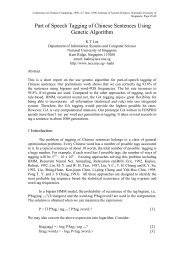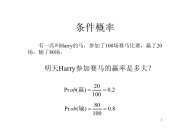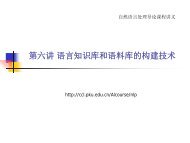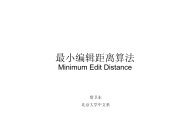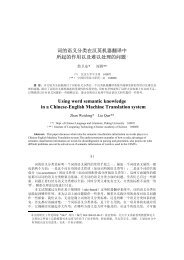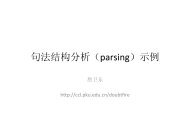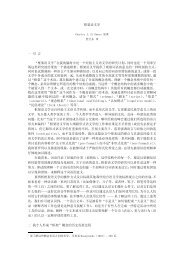A New Perspective On Chinese ZIJI
A New Perspective On Chinese ZIJI
A New Perspective On Chinese ZIJI
Create successful ePaper yourself
Turn your PDF publications into a flip-book with our unique Google optimized e-Paper software.
However, it is interesting to note that, by contrast, the subject of a<br />
clause cannot always bind an instance of ziji which iscontained in an<br />
adjunct of that clause and which is c-commanded by that subject. As<br />
shown in (31)-(32), this holds true whether the adjunct precedes or<br />
follows the clause to which it adjoins:<br />
(31) Zhangsan shuoi [[ruguo Lisij piping zijii=j= k, [Wangwuk Zhangsan say if<br />
jiu bu hui qu]]].<br />
Lisi criticize self Wangwu<br />
then not will go<br />
`Zhangsani says that if Lisi criticizes himi= won't go.<br />
k/himself, Wangwuk (32) Zhangsani shuo [Wangwuj bu hui qu, [yinwei Lisik mei<br />
Zhangsan say Wangwu<br />
yaoqing zijii= j=k]].<br />
not will go because Lisi have-not<br />
invite self<br />
`Zhangsani says that Wangwuj won't go because Lisi didn't<br />
invite himi= j/himself.'<br />
Example (32) is particularly telling, since, out of context, the binding<br />
by Wangwu would appear to be pragmatically favored, and yet it is<br />
unacceptable, in spite of the fact that binding by either a higher or<br />
lower subject is wholly acceptable. Binding cases involving relative<br />
clauses provide a further interesting contrast. Consider example (33),<br />
where the re exive occurs in a relative clause:<br />
(33) Lisii zhidao [Zhangsanj bu xihuan [neixie [ek piping<br />
Lisi know<br />
zijii=j=k de<br />
Zhangsan<br />
renk]]] not like those criticize<br />
self DE person<br />
`Lisii knows that Zhangsanj doesn't like those people who<br />
criticize himi=j/themselves.' Either the matrix subject or the subject of the clause immediately<br />
containing the relative clause, can be the antecedent ofziji, incontrast<br />
to examples in (31) and (32), where ziji occurs in an adverbial clause.<br />
The di erence between relative clauses and adverbial clauses is that a<br />
relative clause is contained in a coargument of the subject, and hence an<br />
instance of ziji within the relative clause can take as its antecedent the<br />
subject of the immediate clause containing the relative clause. Facts<br />
such as these, which would appear to be di cult to square with ccommand-based<br />
accounts, will be explained by our analysis.<br />
6. Toward a <strong>New</strong> Analysis of Ziji



